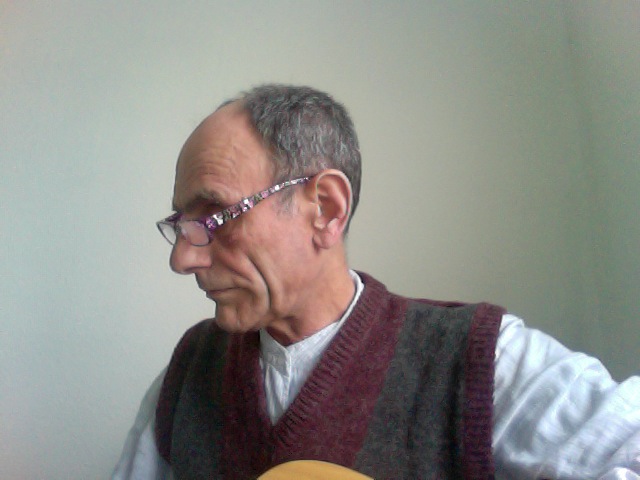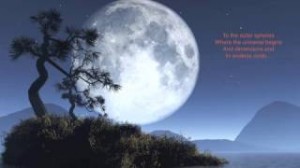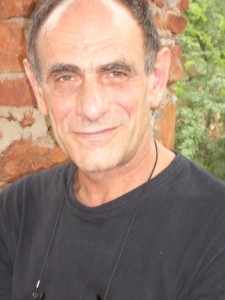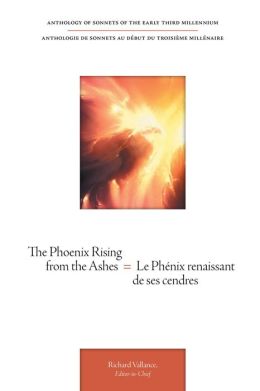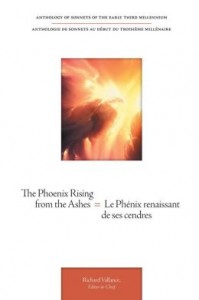Filming ‘Blood Shot Silk’ – Deleted Scene (38)
One frame inheriting another…
Blood on marble and white roses.
Stand-alone vampire crystallizes into a statue.
The nearest pall-bearer sucks air. Crushed urn.
Froth overruns chapelry pews
Through a hinge-wrecked door –
An ephemeral embodiment.
Filming ‘Blood Shot Silk’ – Deleted Scene (39)
Take No. 7
In rubescent lamé pyjamas.
Sabrina Roper’s is a skin-deep part,
Moulding exposed nerves
In the screening room.
A moon-buffed kiss on hand.
His Satanic Majesty simpers.
Runaway violin a bedlamite tango…
Chimps neighing over the sobs of men…
Filming ‘Blood Shot Silk’ – Deleted Scene (40)
The picture palace reviews
May get off-the-beam
About the overacting.
Hold the focus,
Instantaneous sunrise behind a shot –
Costumes: the fantasia keeps time
With a hue and cry.
The limelit alehouse at dead of night.
Our Stunt Co-ordinater isn’t exasperated
By bee swarms in gusts,
Nor the beg-hard grimace
On Manola Dean’s hauled up face.
Filming ‘Blood Shot Silk’ – Deleted Scene (41)
Fuzz on Bevan’s palms
Flaunted as the transom’s pegged.
Simon, the Boom Operator, tips to the left.
Cut to…billboard puffing the movie show ‘Nosferatu’.
Camera 6 whirls to Sabrina Roper
In the ruck of a bee-keepers net.
A schnauzer piddles in floorboards.
The relinquished rocking chair teeters
Indicating tea, sandwiches
And a twist-ragged Script Conference.
Filming ‘Blood Shot Silk’ – Deleted Scene (42)
Smoke machine on a brae…
A hog spews on moss.
Effervescence in dirty sky.
Disfigured colour sergeant gains time,
Pulls out a smooth-bore.
Snigger, incandescent flash.
The dream is taking flesh.
Drumroll on soundtrack – mental note.
The regular steps of the fait accompli
May be fair-weather, deleted.
Christopher Barnes, UK. Some bio details…
In 1998 I won a Northern Arts writers award. In July 200 I read at Waterstones bookshop to promote the anthology ‘Titles Are Bitches’. Christmas 2001 I debuted at Newcastle’s famous Morden Tower doing a reading of my poems. Each year I read for Proudwords lesbian and gay writing festival and I partake in workshops. 2005 saw the publication of my collection LOVEBITES published by Chanticleer Press, 6/1 Jamaica Mews, Edinburgh.
On Saturday 16Th August 2003 I read at the Edinburgh Festival as a Per Verse poet at LGBT Centre, Broughton St.
I also have a BBC web-page www.bbc.co.uk/tyne/gay.2004/05/section_28.shtml and http://www.bbc.co.uk/tyne/videonation/stories/gay_history.shtml (if first site does not work click on SECTION 28 on second site.
Christmas 2001 The Northern Cultural Skills Partnership sponsored me to be mentored by Andy Croft in conjunction with New Writing North. I made a radio programme for Web FM community radio about my writing group. October-November 2005, I entered a poem/visual image into the art exhibition The Art Cafe Project, his piece Post-Mark was shown in Betty’s Newcastle. This event was sponsored by Pride On The Tyne. I made a digital film with artists Kate Sweeney and Julie Ballands at a film making workshop called Out Of The Picture which was shown at the festival party for Proudwords, it contains my poem The Old Heave-Ho. I worked on a collaborative art and literature project called How Gay Are Your Genes, facilitated by Lisa Mathews (poet) which exhibited at The Hatton Gallery, Newcastle University, including a film piece by the artist Predrag Pajdic in which I read my poem On Brenkley St. The event was funded by The Policy, Ethics and Life Sciences Research Institute, Bio-science Centre at Newcastle’s Centre for Life. I was involved in the Five Arts Cities poetry postcard event which exhibited at The Seven Stories children’s literature building. In May I had 2006 a solo art/poetry exhibition at The People’s Theatre why not take a look at their website http://ptag.org.uk/whats_on/gallery/recent_exhbitions.htm
The South Bank Centre in London recorded my poem “The Holiday I Never Had”; I can be heard reading it on www.poetrymagazines.org.uk/magazine/record.asp?id=18456
REVIEWS: I have written poetry reviews for Poetry Scotland and Jacket Magazine and in August 2007 I made a film called ‘A Blank Screen, 60 seconds, 1 shot’ for Queerbeats Festival at The Star & Shadow Cinema Newcastle, reviewing a poem…see www.myspace.com/queerbeatsfestival On September 4 2010, I read at the Callander Poetry Weekend hosted by Poetry Scotland. I have also written Art Criticism for Peel and Combustus Magazines.
